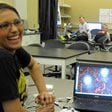Science fairs encourage students to explore
HANCOCK – Through the Western Upper Peninsula Center for Science, Mathematics and Environmental Education, students from the five Western U.P. counties are offered hands-on incentives to explore science, math, engineering and the environment in which they live.
Read more at the Mining Gazette, by Graham Jaehnig (subscription required).


